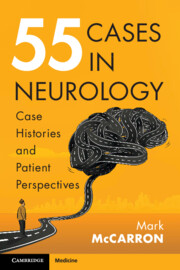Book contents
- 55 Cases in Neurology
- 55 Cases in Neurology
- Copyright page
- Contents
- Preface
- Acknowledgements
- Section 1 Visual Disturbance
- Section 2 Headache and Pain
- Section 3 Weakness
- Section 4 Behavioural and Language Changes
- Case 29 Emotional Consequences
- Case 30 Covalent Cascade
- Case 31 Progressive Silence
- Case 32 Personality Change
- Case 33 Evolving and Changing Neurology
- Section 5 Confusion
- Section 6 Movement Disturbances
- Section 7 Acute Onset of Neurological Symptoms
- Index
- Plate Section (PDF Only)
- References
Case 29 - Emotional Consequences
from Section 4 - Behavioural and Language Changes
Published online by Cambridge University Press: 27 July 2023
- 55 Cases in Neurology
- 55 Cases in Neurology
- Copyright page
- Contents
- Preface
- Acknowledgements
- Section 1 Visual Disturbance
- Section 2 Headache and Pain
- Section 3 Weakness
- Section 4 Behavioural and Language Changes
- Case 29 Emotional Consequences
- Case 30 Covalent Cascade
- Case 31 Progressive Silence
- Case 32 Personality Change
- Case 33 Evolving and Changing Neurology
- Section 5 Confusion
- Section 6 Movement Disturbances
- Section 7 Acute Onset of Neurological Symptoms
- Index
- Plate Section (PDF Only)
- References
Summary
A 41-year-old man described ‘buckling’ of his knees when he was laughing while attending a stock-car race. He recovered within seconds. He was sure that he did not lose consciousness. Over the next six months, he had multiple similar episodes, although not all of these seemed to have been associated with emotional change. He was admitted to hospital as he had three episodes in the one day. His partner explained that he could be eating and suddenly his head would drop, his mouth would open and his eyes close. His sister and partner confirmed that he was involuntarily falling asleep much more often during the day. His partner also reported that he was snoring more frequently. He described at least one episode of being unable to move while in bed.
- Type
- Chapter
- Information
- 55 Cases in NeurologyCase Histories and Patient Perspectives, pp. 199 - 206Publisher: Cambridge University PressPrint publication year: 2023



